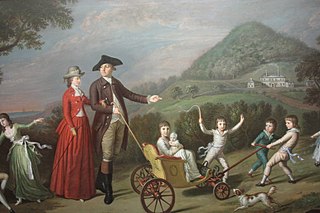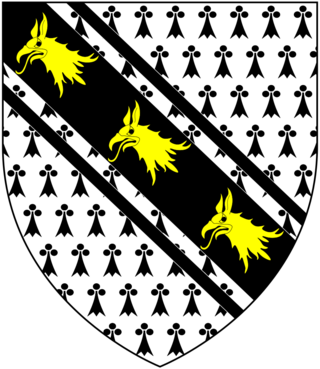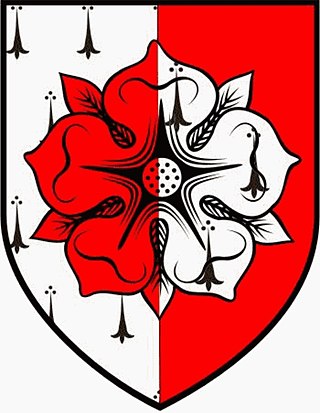
West Torrington is a small hamlet in the East Lindsey district of Lincolnshire, England. It is situated on the edge of Bleasby Moor and 3 miles (4.8 km) north from Wragby. The 2001 Census recorded a West Torrington population of 69, increasing to 128 at the 2011 census.

Sir Charles Miles Lambert Monck, 6th Baronet was an English politician. He succeeded to the Baronetcy of Belsay Castle on the death of his father in 1795.
The Langham Baronetcy, of Cottesbrooke in the County of Northampton, is a title in the Baronetage of England. It was created on 7 June 1660 for John Langham, Member of Parliament for the City of London in 1654 and for Southwark in 1660 and 1661. The second Baronet was Member of Parliament for Northamptonshire and Northampton while the third Baronet sat for Northampton. The seventh Baronet was Member of Parliament for Northamptonshire. The tenth Baronet represented St Germans in the House of Commons. The thirteenth Baronet was a photographer, ornithologist and entomologist and served as High Sheriff of County Fermanagh in 1930.

There have been seven baronetcies created for persons with the surname Russell, three in the Baronetage of England and four in the Baronetage of the United Kingdom.

Sir James Hunter Blair, 1st Baronet FRSE was a Scottish banker, landowner and politician.

The Wedderburn, later Ogilvy-Wedderburn Baronetcy, of Balindean in the County of Perth, is a title in the Baronetage of the United Kingdom created in 1803.

The Yonge Baronetcy, of Culliton in the County of Devon, was a title in the Baronetage of England. It was created on 26 September 1661 for the merchant and Member of Parliament, John Yonge. He was succeeded by his son Walter, the second Baronet. He was also a Member of Parliament. His son, the third Baronet, sat in the House of Commons for more than a quarter of a century. On his death the title passed to his son, the fourth Baronet. He was also a politician and served as Secretary at War. He is also remembered for his diaries. He was succeeded by his son, the fifth Baronet. Like his father he served as Secretary at War and was also Governor of the Cape Colony. The baronetcy became extinct on his death in 1812.
Peregrine Hoby, was an English landowner and member of parliament who sat in the House of Commons at various times between 1640 and 1679.

The Nightingale Baronetcy of Newport Pond is a title in the Baronetage of England and a rank in the British aristocracy. It was created by King Charles I of England, on 1 September (1628), and is one of the oldest baronetcies to remain active in England.

The Kirkpatrick Baronetcy, of Closeburn in the County of Dumfries, is a title in the Baronetage of Nova Scotia. It was created on 26 March 1685 for Thomas Kirkpatrick, with remainder to heirs male whatsoever. The family seat of the Kirkpatrick family was Closeburn Castle, Dumfriesshire.

Nathaniel Curzon, 1st Baron Scarsdale of Kedleston Hall, Derbyshire was an English Tory politician and peer.

Nathaniel Curzon, 2nd Baron Scarsdale was an English Tory politician and peer.

The Hildyard Baronetcy, of Patrington in the County of York, was a title in the Baronetage of England. It was created on 25 June 1660 for Robert Hilyard, of Patrington and Winestead. The ancient Hildyard family is thought to have been of Saxon origin. Robert Hildyard served as Gentleman of the Bedchamber to King Charles I of England and was a major-general in the King's army during the English Civil War. He took part in the Battle of Marston Moor. He was raised to a baronetcy by Charles II following the Restoration of the Monarchy. He was succeeded by his grandson Sir Robert Hildyard, 2nd Baronet, a Member of Parliament for Hedon. He was succeeded by his nephew, the third Baronet, who was Member of Parliament for Great Bedwyn. The latter's son, the fourth Baronet, was High Sheriff of Yorkshire in 1783. On his death in 1814 the baronetcy became extinct.
Robert Ainslie may refer to:
Sir Robert Ainslie, 1st Baronet was a British ambassador to the Ottoman Empire, orientalist, numismatist and Member of Parliament (MP) for the rotten borough of Milborne Port, in Somerset, between 1796 and 1802.

The Davers Baronetcy, of Rougham in the County of Suffolk, was a title in the Baronetage of England. It was created on 12 May 1682 for Robert Davers, who had made a great fortune in Barbados as a plantation owner before acquiring the Rougham estate in Suffolk. The second and fourth Baronets represented Bury St Edmunds and Suffolk in Parliament. The sixth Baronet sat as Member of Parliament for Weymouth and Bury St Edmunds. Despite having an alleged nine illegitimate children, the 6th Baronet left his estates to his nephew, Frederick Hervey, 1st Marquess of Bristol, and his baronetcy became extinct.
Sir Jeremy Sambrooke, 4th Baronet of Bush Hill, Enfield, Middlesex, was a British landowner and Tory politician who sat in the House of Commons from 1731 to 1740.

The Howe baronetcy, of Compton in the County of Gloucester, was created in the Baronetage of England on 22 September 1660 for John Howe, Member of Parliament for Gloucestershire in 1654–1655 and 1656–1658. His elder son Richard, the second baronet, was also an MP, as was his younger son John Grobham Howe. Sir Richard Grobham Howe, the third baronet, was MP for Tamworth, Cirencester and Wiltshire. Sir Emanuel Scrope Howe, 4th Baronet became the 2nd Viscount Howe on the death of his father in 1713 and the baronetcy which he inherited in 1730 was merged with his viscountcy.
Robert Vyner, of Gautby, Lincolnshire, was an English politician who represented Lincolnshire from 1794 to 1802.
Sir Samuel Vanacker Sambrooke, 3rd Baronet of Bush Hill, Enfield, Middlesex, was a British landowner and politician who sat in the House of Commons as MP for Bramber and Great Bedwyn.













